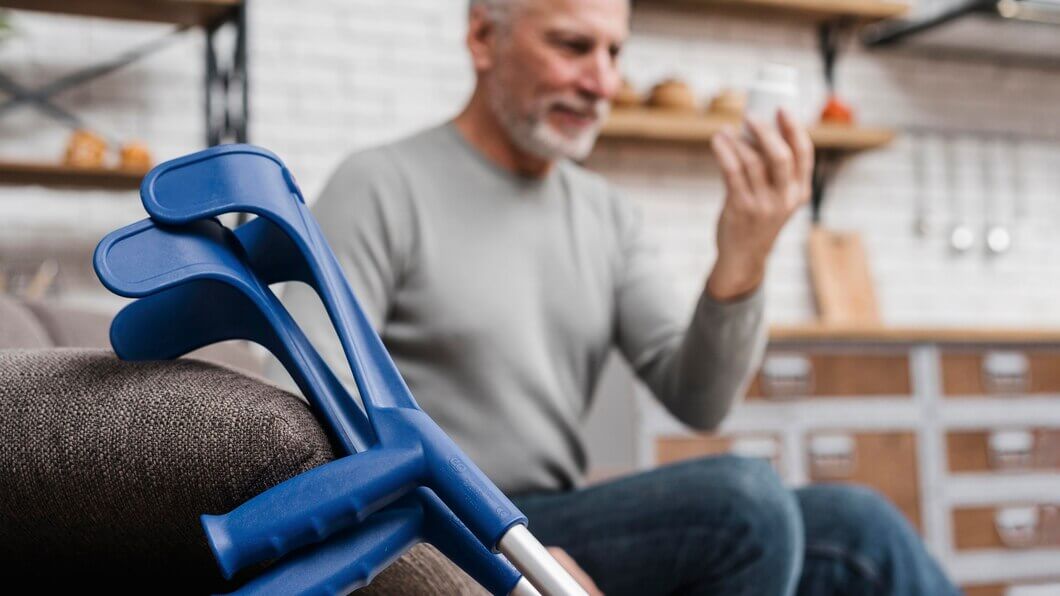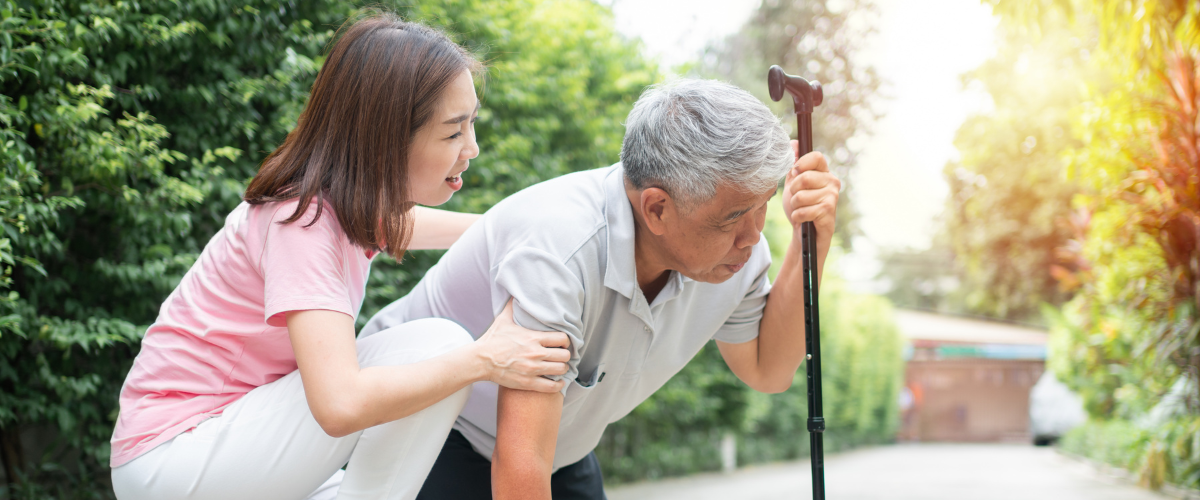According to the Public Health Agency of Canada, 20-30 percent of seniors experience at least one fall each year, and of those seniors who experience a fall, close to 20% die within one year of the fall. So, Senior care is not just about managing medications; ensuring that seniors are protected and safe in their homes should be a top priority for caregivers and families. In this article we will discuss tips to prevent falls among seniors and causes that lead to it.
Here we explore some health conditions that carry higher risks of falls for seniors and some tips to prevent falls.
Table of Contents
ToggleWhy Seniors Are at Risk of Falling?
Falls among seniors can result from a variety of factors, often involving a combination of physical, environmental, and lifestyle-related causes. Here are some of the common causes:
1. Physical Health Issues:
- As people age, they may experience a decline in muscle strength and balance, making it harder to stay steady on their feet.
- Conditions such as arthritis, Parkinson’s disease, diabetes, and heart disease can affect mobility, balance, and reflexes, increasing the risk of falls.
- Declining vision and hearing can lead to misjudgments of the environment, such as not seeing obstacles or not hearing warnings, which can result in falls.
- Some medications can cause dizziness, drowsiness, or low blood pressure, which can contribute to a higher risk of falling.
Make us your companion in diabetes care
2. Indoor Fall Risks:
- Items left on the floor, loose rugs, and electrical cords can be tripping hazards for seniors.
- Inadequate lighting in the home, especially in stairways, hallways, and bathrooms, can make it difficult to see potential hazards
- Wet or polished floors, particularly in bathrooms or kitchens, can increase the chances of slipping.
Read More: 9 Common Home Safety Hazards and Their Practical Solutions
3. Behavioral Factors:
- Engaging in activities without necessary precautions, like standing on a chair to reach something high or rushing to answer the door, can lead to falls.
- Not using, or improperly using, devices like canes, walkers, or handrails can significantly increase the risk of falling.
4. Cognitive Impairments:
Cognitive decline can lead to poor judgment, disorientation, and an inability to recognize potential dangers, which significantly increases the risk of falls.
5. Footwear:
- Wearing ill-fitting shoes, high heels, or slippery-soled footwear can contribute to falls.
- Try alternatives such as shoes with nonslip sole and medicated shoes that are typically designed for people with medical conditions ( diabetes, arthritis)
6. Fear of Falling:
With advancing age and increasing lack of mobility, many seniors develop a fear of falling and related injuries. As a result, they limit their activity levels. This, however, has a severe effect on their cognitive abilities and contributes to an increased risk of falling and fractures.

Tips to prevent Falls:
When it comes to fall prevention, the good news is that it can often be addressed with simple adjustments.
1. Exercise Regularly:
People 65 and older need aerobics exercises, if not done it will lead to the risk of falls and other health-related issues. A CDC review shows that 150 minutes of aerobics per week is recommended for improved balance and muscle strength. This could be broken down into 30 mins a day for 5 days.
These activities to improve balance can be followed;
- Mow the lawn or rake the leaves.
- Learn a new dance.
- Walk to the store.
- Hike a trail.
- Do active forms of yoga (such as Vinyasa or power yoga).
- Ride a bike inside or outside.
- Join a water aerobics class
Seniors with chronic diseases can not be involved in intense physical exercises as it can worsen the condition, specifically people with heart problems. For such conditions, a recommendation from a physician is mandatory for what amount of physical activity is right for them.
2. Make Home Safety Modifications:
Ensure that the home is free of tripping hazards. Remove loose rugs, secure cords, and declutter walkways. Install grab bars in bathrooms, handrails on stairs, and improve lighting in all areas, especially in dark hallways and entrances.
3. Use Assistive Devices:
Use canes, walkers, or other assistive devices as needed. These tools provide additional support and stability, particularly when moving around or transitioning between sitting and standing.

4. Manage Medications:
Review medications regularly with a healthcare provider. Some medications can cause dizziness or drowsiness, which can increase the risk of falls. Adjusting dosages or switching medications might be necessary. If you are taking supplements. It is advised to consult with a doctor to mitigate any side effects they may be causing with your other medications.
5. Get Regular Vision and Hearing Checks:
Ensure that seniors have regular eye exams and update prescriptions as needed. Poor vision or hearing can affect balance and coordination.
Read More: How to Care for Seniors with Vision Problems
6. Maintain a Healthy Diet:
Dehydration and poor nutrition can lead to weakness and dizziness, increasing the risk of falls. Encourage a balanced diet rich in calcium and vitamin D to support bone health.
7. Rise Slowly:
When getting up from sitting or lying down, take your time. Sudden movements can cause dizziness or light-headedness, leading to falls.
8. Keep Frequently Used Items Within Reach:
Place everyday items in easily accessible locations to avoid the need for stretching, bending, or climbing. This simple adjustment can prevent unnecessary risks.
9. Stay Socially Active:
Engage in regular social activities. Isolation can lead to depression and a decrease in physical activity, both of which increase fall risk. Staying active socially helps maintain physical and mental health. Seniors can also engage themselves in simple exercises such as tai chi or gentle yoga. These exercises help strengthen muscles and enhance balance.
To Learn More:
Reach out to us at wecare@considracare.com and we will be happy to discuss the care needs of your loved ones, help you decide upon the best options, and guide you on how to have a discussion with them around getting professional care.

Conclusion:
Falls among seniors can be lethal. Seniors and their families need to educate themselves about fall risks and tips to prevent falls. The tips to prevent falls can be as simple as removing hazards in seniors’ homes, a healthy diet, exercising, rest, assistive devices, and regular medical exams. A professional live-in caregiver can help families assess the fall risks in the home and help implement tips to prevent falls for elderly safety.
FAQ’S
1. How to avoid fall in old age?
To avoid falls in old age requires changes such as home/lifestyle modification and regular health check-ups. Exercising regularly has also proven beneficial as it helps retain balance in old age.
2. What Is the Leading Cause of Injury in Canada?
The leading cause of injury in Canada is falls. Falls are particularly common among older adults, and they account for a significant number of hospitalizations and emergency room visits. According to the Public Health Agency of Canada, falls represent over 85% of injury-related hospitalizations among seniors.
3. What Are the Four Areas of Fall Prevention?
The “4 P’s” of fall prevention are a helpful framework used to address and reduce the risk of falls, particularly among older adults. These include:
- Pain (Address your pain)
- Position (Ensure proper body alignment)
- Placement (strategic positioning of items and furniture)
- Personal needs (Meeting personal needs promptly)
4. What Is the Greatest Indicator of Risk for Falls?
The greatest indicator of risk for falls is fear of falls. If a senior has fallen before, their fear grows inside, if not, growing age will increase this fear. It can have significant effects on their overall well-being and quality of life. It also leads to reduced activity and social isolation.
5. What is the number one exercise to increase balance in seniors?
Feet apart is the balance exercise. Stand with your feet about shoulder-width apart and keep your eyes open. Hold this position for 10 seconds, gradually increasing to 30 seconds as you build stability. If you notice yourself swaying or needing to reach out for support, continue practicing this exercise until you can maintain the position with minimal movement or assistance.
How to Walk to Prevent Falls?
To walk safely and prevent falls, consider the following tips:
- Use Assistive Devices: If needed, use a cane or walker for added stability.
- Focus on Posture: Keep your head up, and back straight, and avoid leaning forward.
- Watch Your Step: Be aware of your surroundings,
- Take Your Time: Avoid rushing, especially when changing direction or getting up from a seated position.
Maryam is a leading writer at ConsidraCare, specializing in senior care. Her well-researched articles are widely recognized for guiding families through the complexities of caring for loved ones, establishing her as a trusted and authoritative voice in the field.


